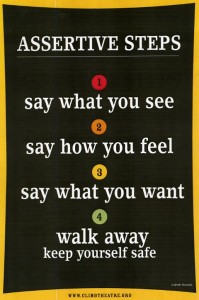We all want assertive kids. We all want polite kids. We all want kids with great self esteem and a high confidence level. I am sure no one is on the fence here. Where the lines get blurred, is how to raise an assertive child, to teach them to get their needs met, without being obnoxious and rude.
I know an assertive kid who totally comes off as rude and obnoxious, but he definitely gets his needs attended to. I look at my big son– he is ANYTHING but rude, but we are working on his assertiveness, and trying to teach him how to ask for what he wants. My little son on the other hand, walks into a room, and you know he’s there, boy! He asks for what he wants, he gets what he needs and he’s super assertive. But with him, I have to be careful he doesn’t cross the rudeness line. God bless my two polar opposite children. Besides them both being handsome like their dad, you’d never guess they were related! Yesterday morning, I caught my little guy singing, “Shake your balls, shake your balls.” When I asked him who taught him this song, he told me it was this one kid in his class… the SWEETEST kid in his class. My husband and I don’t believe him. And when his actions evoke a strong reaction from my husband, that’s all my little one needs… he RUNS with it… “Shake your balls, shake your balls, shake your balls….”
So, back to assertiveness. What does “being assertive” mean anyhow, and how can you teach your children to be assertive without being rude. Let’s take a look.
Basic concept:
Assertion theory is based on the premise that every individual possesses basic human rights:
- the right to be treated with respect
- the right to make mistakes and be responsible for them
- the right to refuse requests without having to feel guilty or selfish
- the right to ask for what you want (realizing that the other person has the right to say ‘no’)
- the right to be listened to and to be taken seriously
- the right to say “I don’t understand”
- the right to ask for information
The reason assertive people often come off as rude or controlling, is because most people do not like to be told what to do, or how to do it. This holds true for both adults and children. So the key to assertiveness is learning how to stand up for yourself, without making others feel imposed upon. Assertiveness is a skill anyone can develop with time and the proper practice.
Therefore, in raising assertive children that can stand up for themselves, and that aren’t rude, here are five important tips.
- You must be the role model. Your children will copy you. So, if you want them to have integrity and assertiveness, model good behavior. Don’t be weak, your children will see it. Stand up for your beliefs and views, even if it means going against the grain. You have to explain to them that standing up for what they believe in may feel uncomfortable or strange, but it is the right way to go… to stand up for their own rights, and the rights of others.
- When your child acts assertively, praise them. Let your kids know that you value people who speak their mind. Positively reinforce their actions if they displayed good behavior, for example, “Jenny, I love how you spoke up for yourself when Tyler was being mean to you.” When you show your children you value and honor this type of behavior, they will better assert themselves.
- Controversial but here goes: Try and find a few less domineering friends for your kids. If your child has the tendency to be a shyer, less assertive type, and seems to cling to a bossy and domineering friend, give him the opportunity and expose him to a less domineering friend. Not everyone may agree, but it has been proven to be a confidence booster if their spirit is not constantly being squashed by the aggressive playmate. Being around a less domineering friend may teach and encourage your child to speak up a little more.
- Provide leadership opportunities early. New studies show that kids gain confidence by entering into individual sports, team sports, activities, extra-curricular activities, group projects etc. And the key factor behind it is… the earlier the better. So provide opportunities for your children to be a member of a team, or even the team captain. Encourage them to take charge of a project or even organize the schoolyard soccer game. There are other programs you can expose your children to such as public speaking, singing, acting classes, where they can demonstrate overt kinds of leadership. These have all been proven to boost confidence.
- Teach your child C.A.L.M. assertion. There are four steps that help kids stand up and speak up for themselves or others if verbally attacked. Here are the four steps to C.A.L.M.
C – Stay Cool. If you get upset, ticked off, cry, pout you don’t appear as confident.
A – Assert yourself. Teach your child a few comeback lines to say in different situations.
L – Look the person in the eye. The best way to appear more confident is by using eye contact.
M – Mean it. Teach your child the difference between how an insecure and a strong voice sound. Then encourage your child to assert himself using a strong and firm tone–but not yelling tone–to get his point across.
(Kidscape & Michele Borba)
Teaching your children how to be assertive without being rude is no small undertaking. But remember, all the cliches are true… “you reap what you sew, ” and “you get out what you put in.” Spend the time with your kids, talking and teaching. I try my best, lord knows! My kids and I are all works in progress, but I see major improvements the more I work with them, and for me, there is nothing more thrilling. I just came from my son’s preschool graduation, and when he confidently walked over to get his graduation certificate, I beamed with pride. And then I wept….
xoxEDxox
Tell us, are you raising assertive kids? If so, what are your tips and suggestions? Have you ever seen your kids behave rudely in a public situation and not known how to handle it? Please share your thoughts with our readers.






These are really great suggestions. I have two little girls and my husband and I are always trying to raise them to be good, nice, respectful little girls. Assertive and never rude. Most of the time they’re great, but of course some of the time, and often in public we get tantrums and other joyful behaviors. I think that parents are the best (or worst) role models for their kids to learn. Often obnoxious parents have obnoxious kids and the same goes for polite parents with good values often have good kids.
But I think the desire to raise good kids has to come from the parents. I think peers and teachers don’t have as big of an impact on kids as their own parents. I think we need to be the best role models we can be to raise good kids.
Thanks for a great site.
Congrats on your son’s graduation.
Great post! I really enjoyed this one. you hadn’t written a Blog about kids in a while. Thank you, it’s helpful. I try to help my kids to be assertive every day. it’s a big thing in our house.
For that child who is innately confident and assertive, I say BRAVO. It has been my experience that refining confidence is so much easier than building it up. Certainly the most well intended parent may have a child who has self-esteem issues, but I believe that modeling and providing gentle guidance are key components to enabling a child to believe in themselves….For those overly assertive little ones, you put a smile on my face. My son once told me in front of some new neighbors, “Your breath smells like coffee.” I wanted to put my head in a hole. I suppose he embraced the honesty is the best policy talk…..Out of the mouths of babes!
Zippy Chix 3
http://www.zippychix.com
Great post Erica. 🙂
Great post Erica – my daughter just want through preschool graduation also and I think a lot these days about how teaching her to express her feelings, and how to negotiate relationships and situations these days. Not wanting to go overkill on it, but help her navigate and come from a strong, good place.
Keep posting stuff like this i really like it
Yeah, it’s good, very useful, thanks 🙂
What a great resource!
nice post. thanks.
Thanks for an idea, you sparked at thought from a angle I hadn’t given thoguht to yet. Now lets see if I can do something with it.
I love your website! I’ll make sure to bookmark it and visit you again in the future! great post!
It’s interesting to discover what people have to say. Comments are usually contradictory, but I value the constructive ones. Outstanding piece of writing by the way.
i like your stuff. thanks
[…]here are some links to sites that we link to because we think they are worth visiting[…]…
Ich denke, Kollegen und Lehrer haben nicht so groß der Einfluss auf Kinder als ihre eigenen Eltern. Ich denke, wir müssen die besten Vorbilder wir werden, um gute Kinder zu erhöhen können.
Nice blog. i love children
Great post. Thank you a lot…
Nice blog. thanks a lot..
Great post…thanks a lot!
children 🙂
We visit your site continuously. Thank you admin. Very nice articles and reviews
I feel very happy to have encountered your site and look forward to really more amazing minutes reading here.
tskler
cok güzel bir site arkadaslar
Numerous thanks you considerably for this wonderful and truly instructive small report. All people could possibly get outstanding specifics from this certain content.great operate maintain it up. I’m likely to bookmark this web site for arrived again all over again in future.
Thanks! very good articles. I looking information for job
Love articles, and everything! Thanks!
continuously i used to read smaller articles which as well clear their
motive, and that is also happening with this article which I
am reading here.
Nice share info. Thanks you.!
my car back this page later, I love this, thanks
Oh yeah. Nice share. Thanks.
Informative post. Thanks for sharing, it really helped me alot. Great.
mml?hlo??j?j
What you share always gives me a lot of fun and good luck, thanks
I expect so. thanks for sharing
Besides them both being handsome like their dad, you’d never guess they were related! Yesterday morning, I caught my little guy singing, “Shake your balls, shake your balls.”
My kids and I are all works in progress, but I see major improvements the more I work with them, and for me, there is nothing more thrilling.
If your child has the tendency to be a shyer, less assertive type, and seems to cling to a bossy and domineering friend, give him the opportunity and expose him to a less domineering friend.
the sharing of your information is very good for us, I want you with useful information such
I like the team or
Thanks for good insight.